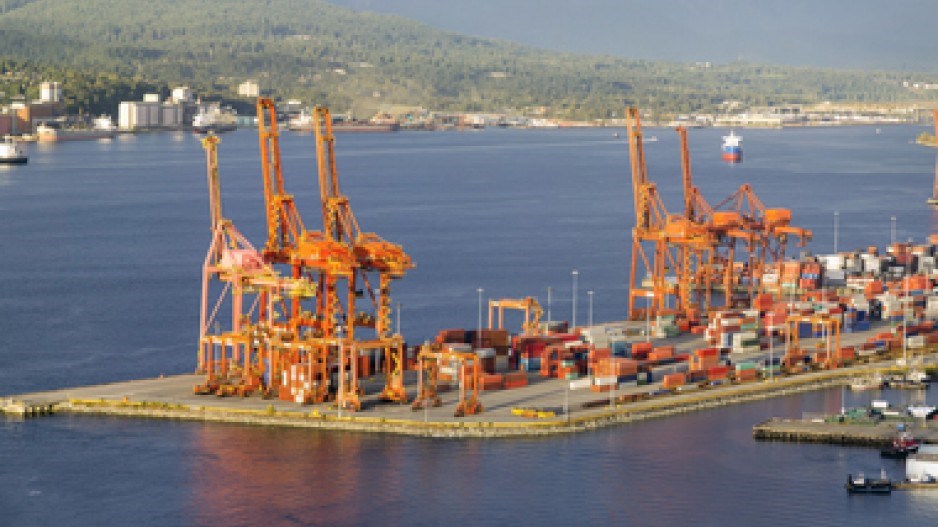Ken Lyotier can hear a deep, oscillating noise that goes on 24 hours a day when ships are in Port from his home at the corner of Alexander and Columbia streets.
“It’s deep and vibrating and gets right into your bones,” he told the Courier, adding he suspects it comes from generators.
Lyotier, a 67-year-old who has lived in the neighbourhood since 1986, complained to the Port and recently he hasn’t heard the noise nearly as much, but he said activity at the Port produces a “whole host” of other noises, which range from sounds from loudspeakers to warning beeps from vehicles, and that it’s been increasing steadily over the years.
“I totally agree that we live in a very noisy world but I don’t totally agree that we should just accept it forever — that there’s going to be a never-ending increase in the volume of noise in our world and in our dense urban environment,” he said. “We need to be thinking about how we work to reduce noise and think about how we create an environment where people can live and work together with some sense of sanity and health.”
Lyotier isn’t alone in his concerns — noise complaints topped the list of issues raised at a Port Metro Vancouver community meeting hosted by Vancouver East MP Libby Davies at Hastings Community Centre last week.
A couple of people brought audio recordings to illustrate the racket they put up with. Such complaints often reach Davies’ office because the Port is on federal land and isn’t subject to Vancouver noise regulations.
The Port says it’s trying to address the issue. It recently installed four noise monitors on the south shore and another four on the north shore.
The Port plans to make information from the monitors available on its website and it anticipates the monitors will help understand areas where it needs to focus to help reduce noise, and where it is safe to do so. (Certain sounds are required for worker safety, such as beeping when vehicles are backing up, and ships are required to sound horns during particular manoeuvres.)
“Port Metro Vancouver is Canada’s largest and most diversified port that operates 24 hours a day. As a result of residential communities located adjacent to industrial operations, noise complaints remain the number one complaint from residents,” the Port stated in an email to the Courier.
“To address these concerns, and in order to gain a better understanding of the existing noise environment, Port Metro Vancouver has developed a noise monitoring program that will allow us to obtain and record existing noise levels and determine how much noise is attributable to port operations compared with other community noise sources. It will also help us to identify where there might be a noise problem, and if we can make operational improvements to help reduce that noise.”
In 2013, 56% of complaints to the Port stemmed from noise:
- 21% concerned vessel noise (mostly generators);
- 21% concerned terminal/tenants operations;
- 9% concerned rail; and
- 5% are categorized as “other.”
Davies said her office has fielded complaints from as far west as Columbia Street and as far east as the Second Narrows bridge near New Brighton and a little bit beyond.
“Clearly, the big issue [at last week’s meeting] was noise. I felt that the Port carried that away with them — that they really got the message, so I hope there will be constructive follow-up.”
Davies wants the Port to adopt Metro Vancouver noise guidelines and she wants it to work more closely with its tenants to identify specific noises and turn the volume down where it can while still meeting safety considerations. She said some noise is to be expected, but it’s increased a lot over the years and operations continue to expand.
“This is always the balance — we live next door to the Port. The Port is our neighbour. It’s a huge neighbour and it has a giant impact. There were people at that meeting whose family members work at the port — I know that because they told me,” she said. “So it’s a very important base of operation, but it doesn’t dismiss the idea that somehow we’ve got to keep working at a constructive solution to problems that arise from Port operations. The Port is generally aware of that and we keep pushing them.”
Port spokespeople noted at the community meeting that new technology will help curb some noises, and that it will check with tenants to see if the volume of certain sounds can be turned down without affecting worker safety.
For his part, Lyotier maintains he shouldn’t have to move to find relief and he said studies have shown the harm of noise pollution on people’s health.
“I live in an area where I can afford to live. Just because I’m poor shouldn’t mean that I have to suffer health consequences. If we couldn’t change it, that’s different. These are things we can work on and change. That’s the objective of this — where we can make change, we should,” he said.




